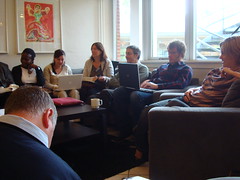
Several elements were brought up during the group discussion.
Probably it is not possible to be objective. A challenge for the communications and information workers is to be aware of the issues and to respond to them. But there probably isn't a way to always get it right. We are subjective, have to be selective. It's easy to bias Northern organizations research as it is so available, so much more advertised than the harder to find, but more valuable, work being done in smaller, Southern and less powerful organisations.
There is also a language bias as material is dominantly in English. A conscious choice of ELDIS to address this bias is to rather create partnerships with organizations/networks who have material in e.g. Spanish or French. This is a better solution that having this material on ELDIS website, where it is not much read as it's audience is mainly anglophone. This approach fits also into ELDIS mandate which is inclusiveness. ELDIS is trying to globalise and finding partners all over which will help them to address these issues.
Talking about donors' agendas, it was felt that colonial history can be influential for what issues donors see as important. What is considered politically important issues at the time also influences the research presented; the concept of 'good governance' seems to be an interesting example in this sense.
At times, also consideration of project funding changes the focus on the research being done. The temptation is always to 'follow the money'. But this should not have influence on research communication. If we look at small projects as opposed to larger donor supported projects, the importance that we put on communicating the results of a project should not be directly related to the amount of funding.
Lastly, the the question of accountability was tabled, with donors that should be accountable to the recipient. How can we ensure this? Would open repositories be a possible solution
See also Euforic newsfeeds on information, knowledge sharing, communication, and from the IMWG 2009 workshop
